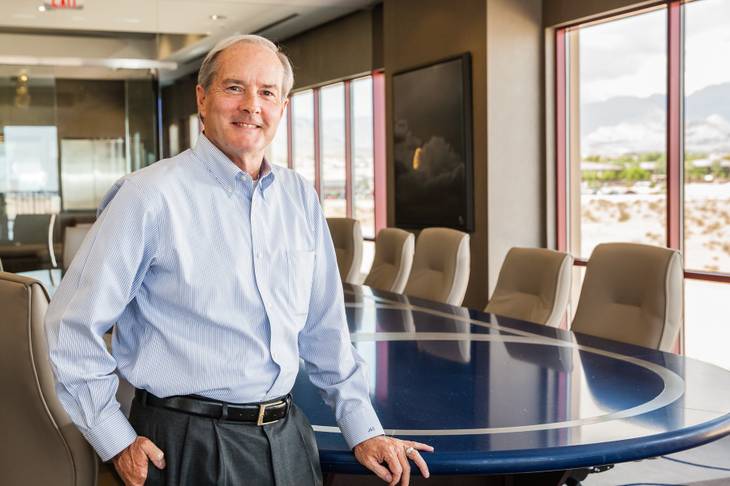John Sullivan is the medical-marijuana banking king of Las Vegas, having signed dozens of planned dispensaries, grow-houses and other pot entrepreneurs as clients.
That’s far more than other lenders in town. In fact, Sullivan appears to be the only one doing it.
The president and CEO of First Security Bank of Nevada has embraced medical marijuana as a new line of business. Attorneys, insurance brokers, landlords and other white-collar types have done the same, but with the industry stuck in legal limbo, many executives are steering clear.
In fact, service providers crucial to any industry are giving marijuana investors a mixed response in Las Vegas. Some are eager for them and the revenue they’d bring, but many others, especially national companies with local offices, are staying away.
“Most of my colleagues won’t touch it,” insurance broker Matt Neely said.
Longtime valley executives — including VEGAS INC owner and publisher Brian Greenspun — and other investors have laid out plans for medical marijuana shops, with hopes of tapping into the rapidly growing industry. The stores and facilities are in the licensing process and likely won’t open until next year.
Investors still have time to get banking, accounting and other services. But if they can’t, earnings likely would be stunted, and business owners might even become targets for criminals.
Without a bank account, for instance, they’d have an all-cash business — not all credit-card companies will process purchases — with limited options for safely depositing stacks of currency.
The main problem clouding the industry: Despite being legal under Nevada law, marijuana remains illegal under federal law. The Obama administration has pledged not to go after law-abiding marijuana users and companies, but businesspeople say there’s no guarantee federal officials won’t change their minds.
Neely is getting in on the action. He helped Las Vegas officials draft insurance guidelines for the sector, and he plans to write policies through his company Cannabis Risk Management.
Businesspeople can make big dollars selling goods and services for medical marijuana, Neely said, but in his industry, some agents are steering clear due to moral objections. Others think it’s a flash-in-the-pan business bound for failure, and heavyweight insurers like State Farm and Travelers refuse to get involved.
“It’s all about risk,” Neely said. “At the end of the day, it’s still a federal crime.”
• • •
Supporters say marijuana relieves pain, controls nausea and vomiting and brings other relief to people stricken with AIDS, cancer and glaucoma. Twenty-three states and the District of Columbia allow medical marijuana, according to the National Conference of State Legislatures. Washington state and Colorado also have legalized marijuana for recreational use.
Nevada voters in 1998 and 2000 approved medical marijuana, but the Legislature set the industry’s ground rules last year. State law requires the businesses be at least 1,000 feet from schools and 300 feet from day care centers, parks and other community gathering spots. The law also caps the number of dispensaries in Clark County at 40.
Nationally, the medical marijuana industry employs roughly 1.7 million people and has grown 16 percent a year since 2009, with revenue hitting $2 billion, according to research firm IBISWorld.
Despite the push, the federal government views marijuana as one of the most dangerous drugs out there. Congress has deemed it a “Schedule I” substance, meaning it has high potential for abuse and no accepted medical use — similar to heroin, LSD and ecstasy.
The U.S. Department of Justice, however, shows no interest in overriding states to shut down the industry. Its hands-off policy gives investors hope they’re in the clear, but the feds could reverse course under a new president in 2017.
“Right now we have a letter from the federal government saying they won’t prosecute. That could change,” said Sean Higgins, a local attorney and medical-marijuana lobbyist.
Meadows Bank has received numerous calls from marijuana investors scouting for financial services, but the Las Vegas lender is turning them down because of the federal ban, CEO Arvind Menon said.
Industry lobbyists have told banks to steer clear, he said, and financial regulators won’t outright say to avoid it, only to enter at their own risk.
“Today their bosses say, ‘Look the other way,’ ” Menon said. “They can’t guarantee that tomorrow, they don’t have a different boss.”
Other lenders staying away include Mutual of Omaha and Wells Fargo, the largest bank in Clark County.
“Our policy of not banking marijuana-related businesses is based on applicable federal laws,” said Tony Timmons, a Wells Fargo spokesman in Las Vegas.
John Sullivan at First Security has bucked the trend, signing more than 50 medical marijuana clients and developing a name for himself as the industry’s go-to banker. Sullivan knows the risks but views it as a legitimate line of commerce and a moral imperative to provide medicine to the sick.
Also, letting businesses deposit their cash will make them and their communities safer, he said. Stories abound of dispensary owners keeping duffel bags filled with cash in their basement or in their store. The last thing Las Vegas needs is headlines about a dispensary getting knocked off by guys with submachine guns.
“Vegas already has enough dings on its reputation,” Sullivan said.
Outside Nevada, some dispensary owners are apparently depositing funds under assumed names, and bankers may be looking the other way, said Arizona dispensary investor Mohit “Moe” Asnani, who has plans for several marijuana businesses locally.
Asnani said it’s a “trade secret” how he manages his cash, and if revealed, he could lose his accounts. His group pays its taxes, he said, but because of federal laws, it can’t work openly with banks as dispensary owners.
“No one flies that flag too high,” he said.
• • •
Bankers aren’t the only ones with mixed feelings. National law firms with valley offices have refused to sign clients, although firms based locally have jumped in, Higgins said.
“There are certainly people who see a lot of dollar signs here,” he said.
Las Vegas accountant Dan Gerety, owner of Gerety & Associates CPAs, isn’t courting marijuana clients, nor does he know how other accountants feel, but he would be glad to work with the new industry.
“It’s a legal business in Nevada, and I don’t think (I’d be) doing anything illegal helping them prepare their taxes properly,” he said.
Many real estate firms, however, don’t want anything to do with it, said former North Las Vegas Mayor Mike Montandon, vice president of business development and government affairs with DC Building Group. His contracting firm is one of them.
“We just don’t want that image of being involved,” Montandon said.
Still, would-be dispensary owners have been signing leases and buying buildings, and there was such a rush for space months ago that prices got inflated, said broker Kit Graski, of Voit Real Estate Services. One of his listings, a closed bank branch on Sunset Road, had nine offers to buy or lease it.
But not every landlord is willing to rent them a storefront, including property owners who haven’t paid off their mortgages. Borrowers often have a clause in their loan that puts them in default for leasing space for illegal activities.
Other landlords don’t want to scare off tenants and shoppers with a dispensary, Graski said.
One business owner who isn’t worried is Bryant Dietz of Press Start Gaming Center, a video-game lounge at Fort Apache Road and Tropicana Avenue.
A dispensary plans to open in his strip mall, and the video-gamers “would kind of appreciate that,” Dietz said. It also would boost foot traffic.
“I don’t mind it at all,” he said.

